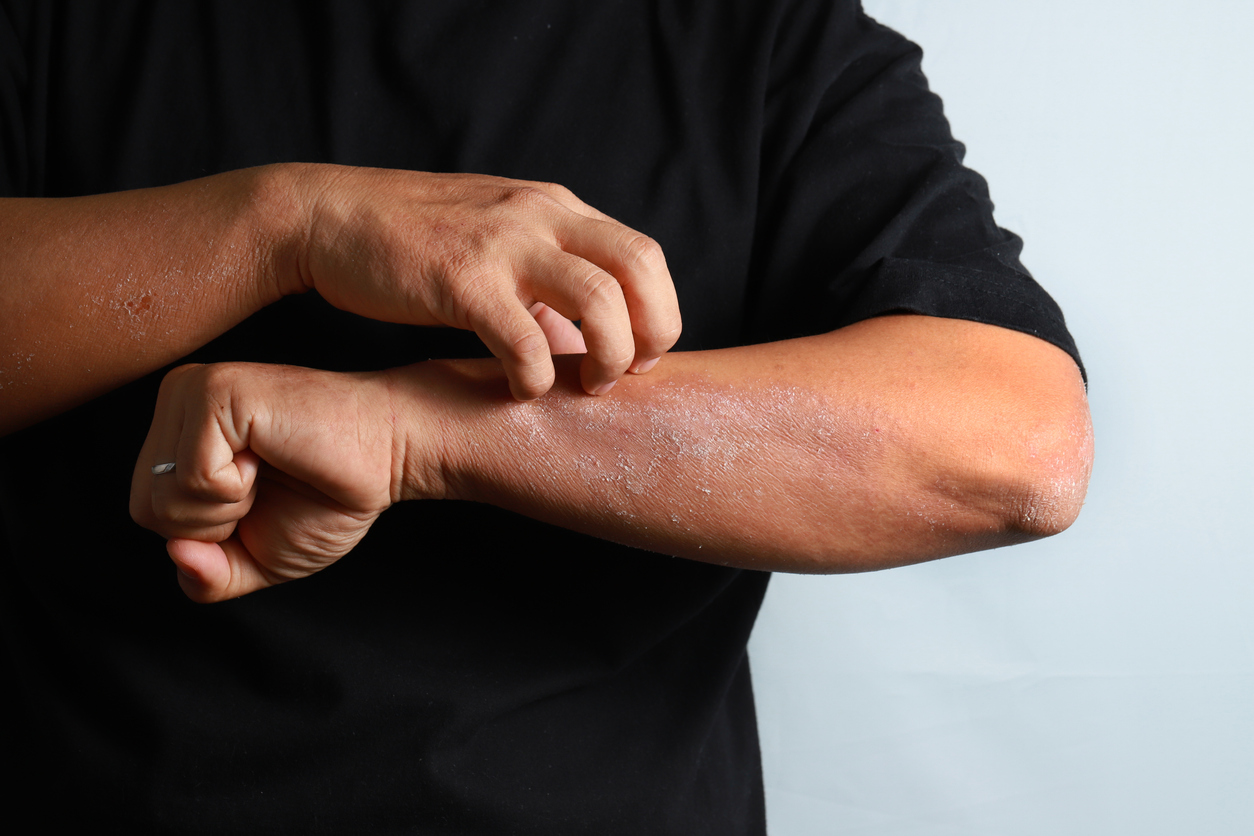Eczema. For those who’ve experienced its relentless itch and unsightly flare-ups, it’s more than just a skin condition; it’s a daily battle. The constant urge to scratch, the red, inflamed patches that seem to appear out of nowhere, the dry, cracked skin that stings and burns—it’s enough to make anyone feel self-conscious and frustrated. But what exactly is eczema? And, more importantly, what can we do about it?
In this comprehensive guide, the expert dermatologists at Skin MD will explore the causes, symptoms, and latest treatment options for eczema. We will also address frequently asked questions and provide valuable insights to help you manage this common skin condition.
Unmasking the Mystery: What is Eczema?
Eczema, also known as atopic dermatitis, is a chronic inflammatory skin condition affecting millions worldwide. It’s characterized by dry, itchy patches on the skin, often accompanied by redness, swelling, and even blisters. Eczema can occur at any age but is most common in infants and young children. Research suggests that 30% of Americans experience eczema at some point in their lives.
The exact cause of eczema remains a mystery, but it’s believed to be a complex interplay of genetic and environmental factors. People with eczema tend to have a weakened skin barrier, making it difficult for their skin to retain moisture. This leads to dryness, itching, and inflammation. Additionally, their immune system is often overactive, triggering inflammation in the skin.
The Many Faces of Eczema: Recognizing the Symptoms
Eczema is a chameleon, manifesting in various ways depending on the individual and the severity of the condition. Some of the most common symptoms include:
- Dry, itchy skin: The hallmark of eczema, this relentless itch can disrupt sleep, affect concentration, and lead to scratching, which can worsen the condition.
- Red, inflamed patches: These patches can appear anywhere on the body, but they’re often found on the face, hands, feet, neck, and inside the elbows and knees.
- Blisters & oozing: In severe cases, eczema can cause the skin to blister and ooze, increasing the risk of infection.
- Thickened, leathery skin: Chronic scratching and rubbing can cause the skin to become thick and leathery, a process known as lichenification.
- Scaly patches: Eczema can also cause the skin to become scaly and flaky.
Navigating the Eczema Maze: Treatment Options at Skin MD
At Skin MD, we understand the challenges of living with eczema. Our team of experienced dermatologists is here to help you find the right treatment plan to manage your symptoms and reclaim your quality of life. Let’s explore some of the most common approaches:
Topical Treatments
- Topical corticosteroids are powerful anti-inflammatory medications that quickly alleviate redness, swelling, and itching.
- Topical calcineurin inhibitors provide another option for reducing inflammation and itching. They’re particularly useful for sensitive areas like the face and neck, where long-term use of corticosteroids may be inadvisable.
Oral or Topical Antibiotics
- In cases where eczema is complicated by an infection, oral or topical antibiotics may be necessary to clear the infection and promote healing.
Monoclonal Antibodies (Dupilumab, Tralokinumab)
- These cutting-edge medications target specific parts of the immune system involved in eczema, offering relief for moderate to severe cases.
Observation & Avoidance of Triggers
- Identifying and avoiding your personal triggers, such as allergens, irritants, and stress, can significantly reduce flare-ups and improve your overall skin health. Our dermatologists can help you identify and develop strategies to avoid triggers.
A Custom At-Home Skincare Routine
- A consistent skincare routine is crucial for managing eczema. We will work with you to develop a personalized routine that includes gentle cleansers, fragrance-free moisturizers, and other products suitable for your skin type and condition.
Remember, eczema treatment is not one-size-fits-all. At Skin MD, we work closely with you to develop a personalized plan that addresses your unique needs and goals. By combining the latest medical advancements with compassionate care, we strive to help you achieve clear, comfortable skin and a better quality of life.
The Eczema Research Frontier
Eczema research is an ever-evolving field, and scientists are constantly exploring new avenues for treatment and prevention. Some exciting areas of research include:
- The Role of the Microbiome: The skin microbiome, a community of bacteria and other microorganisms living on our skin, plays a crucial role in skin health. Research suggests an imbalance in the skin microbiome may contribute to eczema development.
- Biologic Therapies: Biologics are a new class of medications that target specific parts of the immune system. Several biologic therapies are currently under investigation, and some have been approved for treatment with promising results.
- Gene Therapy: Gene therapy involves replacing or repairing faulty genes. While still in its early stages, gene therapy holds immense potential for curing eczema in the future.
Eczema FAQs: Addressing Your Concerns
What triggers eczema flare-ups?
Eczema flare-ups can be triggered by various factors, including dry skin, irritants (soaps, detergents, fragrances), allergens (pollen, dust mites, pet dander), stress, heat, sweating, and infections. Identifying and avoiding your triggers is crucial in managing eczema.
How can I prevent eczema flare-ups?
You can take several steps to prevent flare-ups, such as moisturizing regularly, avoiding irritants and allergens, managing stress, preventing overheating and sweating, keeping your skin clean and dry, and seeing your dermatologist for regular checkups.
Is eczema contagious?
Eczema is not contagious. You cannot catch it from someone else or give it to someone else.
Living with Eczema: Tips for a Better Life
- Establish a Consistent Skincare Routine: Moisturize regularly, use gentle cleansers, and avoid harsh soaps and fragrances.
- Identify and Avoid Triggers: Keep a journal to track your flare-ups and identify potential triggers.
- Manage Stress: Stress can worsen eczema symptoms. Practice relaxation techniques like yoga, meditation, or deep breathing exercises.
- Wear Comfortable Clothing: Opt for loose-fitting, breathable fabrics like cotton. Avoid wool and other irritating materials.
- Keep Your Nails Short: Short nails can help prevent scratching and reduce the risk of infection.
- Seek Support: Connect with others who understand what you’re going through. Join a support group or talk to a therapist.
Eczema can be a challenging condition, but with the right treatment and management, people with eczema can live fulfilling lives. If you are struggling with eczema, don’t hesitate to seek help from a qualified dermatologist. They can provide personalized guidance and support, helping you navigate the complexities of eczema and achieve optimal skin health.
Visit the Best Dermatologists Near Chicago at Skin MD
Our expert team of board-certified dermatologists is here to solve your skin issues. With four easily accessible locations, clear skin has never been easier to achieve. Call (708) 634-5516 to learn more, or book an appointment online today!



